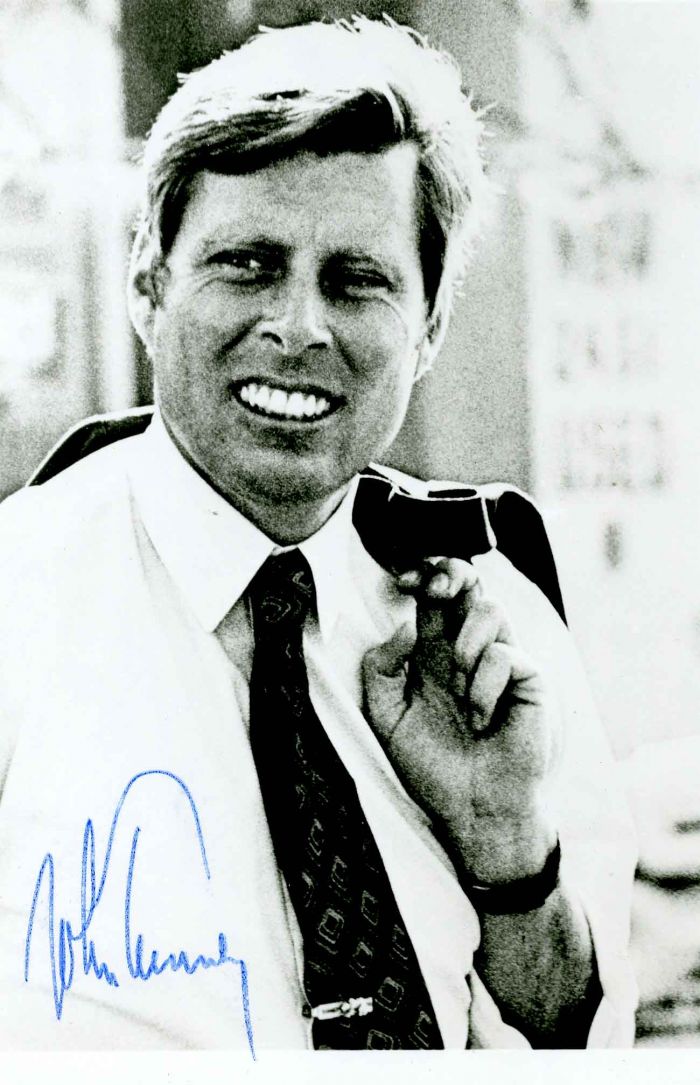Photograph signed by John Tunney
Inv# AU1404
Photograph signed by John Tunney.
John Varick Tunney (June 26, 1934 – January 12, 2018) was a United States Senator and Representative from the state of California. In early 1970, Representative Tunney announced that he would seek the Democratic nomination for Senate. His announcement was followed by fellow Congressman George Brown, Jr. Their primary battle turned into one of the most bitter in California history. One of the key issues was the military draft. While Brown and Tunney both questioned expanding U.S. involvement in Vietnam, Brown opposed a continuation of the military draft while Tunney favored it. This conflict gave incumbent Republican George Murphy an early lead in the polls. Murphy's staunch support for the Vietnam War hurt his campaign and as the general election approached, Tunney overtook him in the polls. The Murphy campaign suffered another setback when he underwent surgery for throat cancer weakening his voice to a whisper. The Tunney campaign used his youthful appearance and high energy to contrast with the aging Murphy. He blatantly compared himself to Robert F. Kennedy, largely through haircuts and poses. Ultimately, Californians split their ticket in the 1970 midterm election, re-electing Republican governor Ronald Reagan and electing Democrat Tunney to the Senate. During his Senate term, Tunney produced a weekly radio report to California, in which he often interviewed other legislators. In 1974, he also authored an antitrust bill known as the Tunney Act. Tunney would later write a book, The Changing Dream. In December 1975, Tunney was an advocate for using American diplomacy in dealing with the Angolan Civil War. American covert and military support for pro-US rebels there suggested a return to the policies that led up toward the highly unpopular Vietnam War. The Senate had postponed passage of the annual defense budget because of concerns the bill contained funds for covert operations against Soviet-backed Angolan rebels. The CIA conducted highly-classified briefings for senators, including Tunney, showing an account of where money was being spent. They failed to persuade him of the policy's usefulness. It was at this time that Tunney introduced an amendment that would cutoff $33 million from the defense budget that were to be allocated to pro-US rebels for covert operations. That effetively ended current and future covert funding from defense appropriations for Angola. Efforts by aid supporters filibustered the cutoff, offered counteramendments, and tried to shelve it in committee. The Ford administration, which strongly supported the covert operations, asserted that the amendment was a threat to both US-Soviet and US-Cuban relations. Cuba had deployed combat troops to Angola a month earlier. On December 20, 1975 Tunney's amendment passed 54-22 having the support of 16 Republicans. Its passage also increased the power of the Congress in foreign affairs at the expense of the executive branch. He was renominated for a second term in 1976 despite a high-profile challenge from his left in the form of Tom Hayden. That fall, Tunney was defeated for re-election by Republican S. I. Hayakawa, the President of San Francisco State University, who had never held elected office. Hayakawa ran as an outsider, and highlighted Tunney's numerous travels, missed Senate votes, and poor Senate attendance record during the campaign. Still, Tunney led in the polls right up to election night, despite a steadily shrinking lead as the campaign wore on. Despite Democrat Jimmy Carter's victory in the presidential election, Tunney lost to Hayakawa in a mild upset (it is to be noted that Republican Gerald Ford carried California in the Presidential election). Tunney resigned his Senate seat on January 1, 1977, two days before his term would officially expire to allow Hayakawa to have seniority over other incoming senators. Throughout Tunney's term as a senator, he served as the junior senator and served with Alan Cranston.










Ebay ID: labarre_galleries